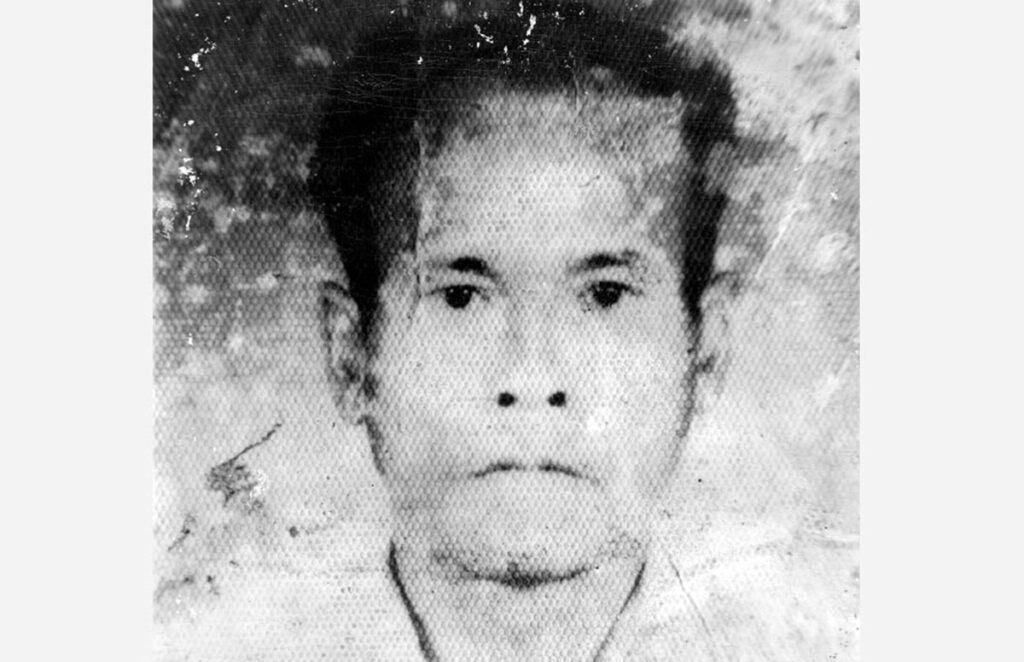Kauv Choa married me when he was 22 and I was 18. Although we lived in the same village, we had never met before his parents came to mine to arrange our engagement. My parents asked for a 100 riel dowry; it was a lot of money at that time. But because his parents loved me, they agreed to it. On our wedding day, we killed many pigs for the reception.
After we were married, my husband moved into my parents’ house. We were poor and rarely had enough to eat. Choa didn’t farm because we didn’t have any rice fields, so he did odd jobs like selling firewood and cakes. Sometimes, we went from our village in Kandal Province to Phnom Penh for four or five days and sold goods in the markets there. Later, he joined the Lon Nol army.
My son Kauv Choeun had been a monk for three years before he became a soldier. He was a gentle man and never used any rough words. He was the only son of our thirteen children. My daughters argued all the time, but Choeun was different. If his sisters were fighting over the fish we had for dinner, he would just eat some rice and leave the house.
Choeun decided to join the Lon Nol army after he heard some propaganda. He had to force himself to do it, though. Choeun married a woman named Chuk Rom; he lived at his wife’s house and they had a son.
Choeun was sent to battle in Kapp Srauv about 15 days before the Khmer Rouge invaded Phnom Penh. He was shot in the leg and taken to the Russian Hospital, but he died because the treatments they had were so poor. I took his corpse to his wife’s hometown for the funeral. She cried loudly until she had no more tears. Choeun’s son was just old enough to sit up when he died.
I feel a lot of regret over losing my only son; I loved him as much as my own life. If Cambodia hadn’t been at war, he would not have died.
Just before the Khmer Rouge took power, our family had left our village to avoid the bombs and went to Kraing Trea Village in Kandal Province. We didn’t bring any valuables along because we didn’t have any; we only brought the clothes we were wearing. We returned to this village after the Khmer Rouge took control. This time, I had my husband’s uniform and some photos of him as a soldier, but I burned all of them.
Even though we were from a village, the Khmer Rouge said we were new people. We didn’t live with the local people, and we didn’t ever have enough food; only rice soup mixed with corn. The Angkar later collected all our belongings – rice, plates, and pots – everything but the clothes we were wearing, and put them into the cooperative. My job was collecting waste from houses and carrying it to a place where I mixed it to make fertilizer, so the three ladles of rice soup they gave us twice a day wasn’t enough for the work I was doing. My stomach was never full after we began to live in cooperatives.
The Angkar suspected people who shaved their heads to get rid of head lice; they thought they were going to perform ceremonies and pray at the temples. Those people were sent for re-education and were interrogated.
Choa went to the hospital for two months for diarrhea and dysentery. He did not want to take the rabbit dropping pills produced by the Angkar. I caught and hid some eels for him to eat, but the Angkar found them and took them. After he died, some new people helped me carry my husband’s corpse to the grave.
After the Khmer Rouge regime collapsed, I went back to Choa’s gravesite. I dug up the earth and I found his skull and teeth. I took his bones to the pagoda to perform a ceremony for him. I felt bad that I didn’t have chance to talk to him because the Angkar wouldn’t let me stay with him in the hospital.
I have kept these two photos very carefully. During the regime, I put them in a plastic bag and kept the bag inside my pocket wherever I went because I was afraid that the Angkar would search my house. One night when I was walking along a canal, I tripped on a wire that was connected to an electric bulb; it was providing light for those who were working at night. The shock I received made me fall into the canal and I got soaking wet. When I arrived home, I took the photos out and dried them in secret. That’s why they are flaking off today.

